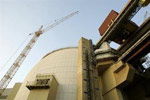 Reuters: Iran’s nuclear and hydropower facilities are well protected from cyber attacks and even the most powerful earthquakes, Iranian environmental protection chief Mohammad-Javad Mohammadizadeh said on Friday. By Tom Miles
Reuters: Iran’s nuclear and hydropower facilities are well protected from cyber attacks and even the most powerful earthquakes, Iranian environmental protection chief Mohammad-Javad Mohammadizadeh said on Friday. By Tom Miles
 GENEVA (Reuters) – Iran’s nuclear and hydropower facilities are well protected from cyber attacks and even the most powerful earthquakes, Iranian environmental protection chief Mohammad-Javad Mohammadizadeh said on Friday.
GENEVA (Reuters) – Iran’s nuclear and hydropower facilities are well protected from cyber attacks and even the most powerful earthquakes, Iranian environmental protection chief Mohammad-Javad Mohammadizadeh said on Friday.
Iran’s only nuclear power reactor at Bushehr was unscathed when a strong earthquake that killed 37 people and injured 850 hit close to the site last month, Iranian officials and the Russian company that built it said.
But that has not stopped fears about safety in a country that sits on major faultlines, especially as Iran’s Atomic Energy Organization said that more reactors would be built there, just hours after the earthquake.
Two U.S. think-tanks, the Carnegie Endowment and the Federation of American Scientists, said before the earthquake struck that warnings over such events had “fallen on deaf ears”.
“Most of the energy producing utilities – including all our power plants, being hydropower or even nuclear – they do comply with the minimum of 8, up to about 10, on the Richter scale for resistance to earthquakes,” Mohammadizadeh told Reuters.
“The highest known levels of safety and environmental standards have always been observed and incorporated during construction and after the commissioning phase,” he said, speaking through an interpreter during an interview at the Iranian diplomatic mission in Geneva.
Mohammadizadeh, also vice president, said Iran was aware of the risks from earthquakes and landslides, which he said applied equally to its hydropower dams.
“Some of the dams we have well over 3 billion cubic meters of water right behind the dam. Imagine what kind of catastrophe a leakage or destruction of the dam could impose,” he said.
CYBER PROTECTION
Besides the threat of natural disasters, Mohammadizadeh also said Iran’s defenses against cyber attacks were as good as any country’s and its facilities were well guarded.
Iran’s uranium enrichment facility at Natanz was the first publicly known target of a computer virus used to attack industrial machinery.
The Stuxnet virus, widely believed to have been developed by the United States and Israel, was discovered in 2010, although researchers at Symantec Corp have uncovered a version deployed two years earlier.
The West suspects such sites are used by Iran to develop a nuclear weapons capability. Tehran says it nuclear program is purely for peaceful means.
“Obviously we have very well managed to protect ourselves from such cyber attacks in not only nuclear facilities and establishments for nuclear power production but also oil and gas and also hydropower as well as the banking network and we have very well protected our system and our information,” Mohammadizadeh said.
“We have developed locally the knowledge of counteracting such cyber attacks and we have very well mastered it,” he said. “Up to now we have always had success in countering such attacks and we expect to continue to do so.”
A senior U.S. Air Force official told reporters in January that Iran responded to the 2010 Stuxnet attack by beefing up its own cyber capabilities, and would be a “force to be reckoned with” in the future.
Indeed, Western analysts say Iran has launched increasingly sophisticated cyber attacks itself in a confrontation with its adversaries, including the United States, Israel and Gulf Arabs, as pressure increases on Tehran to curb its nuclear program.
Mohammadizadeh likened cybersecurity to protecting one’s health, with a need for preventive and protective steps.
“The issue of protecting against cyber attacks is not in a standstill situation. It will always be on the move and progress further to ensure a safe environment,” he said.
(Additional reporting by Fredrik Dahl in Vienna; Editing by Alison Williams)


